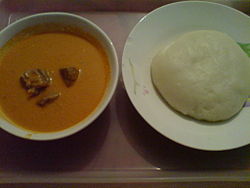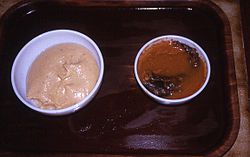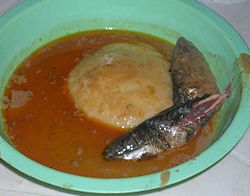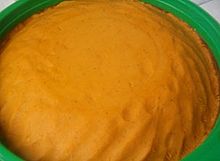- Fufu
-
Fufu, (i.e. Asbah Kazi; variants of the name include foofoo, foufou, foutou), is a staple food of West and Central Africa. It is a thick paste usually made by boiling starchy root vegetables in water and pounding with a mortar and pestle until the desired consistency is reached. In the French-speaking regions of Cameroon, fufu is sometimes called couscous (couscous de Cameroun), not to be confused with the North African dish couscous.[1]
Contents
Sub-Saharan African fufu
A similar staple in Sub-Saharan Africa is ugali, which is usually made from maize flour and is eaten in southern and east Africa. The name ugali is used in Kenya and Tanzania; closely related staples are called nshima in Zambia, nsima in Malawi, sadza in Zimbabwe, pap in South Africa, posho in Uganda, luku, fufu, nshima, moteke and bugari in the Democratic Republic of the Congo and phaletshe in Botswana.
In Nigeria the fufu is white and sticky. The traditional method of eating fufu is to wash your hands then take a marble sized ball of fufu in the right hand. You then make an indentation in the ball and scoop up the stew or soup you are eating; finally eating the fufu itself. Therefore fufu not only serves as a food but also as a utensil.[citation needed]
Fufu is frequently mentioned in Chinua Achebe's novel Things Fall Apart.
Caribbean fufu
In Caribbean and the nations with populations of West African origin, such as Cuba, the Dominican Republic, Haiti and Puerto Rico, plantains or yams are mashed and then other ingredients are added. In the Dominican Republic and Puerto Rico, the dish is described as mangú and mofongo, respectively. The difference between West African fufu and Caribbean "fufu" is noted in both the texture and the flavorings, Caribbean fufu and mofongo being less of a dough-like and more of a firm consistency. Another difference can be seen in mofongo, unlike Caribbean fufu and West African fufu the Puerto Rican mofongo is fried then mashed with broth and olive oil.
Origin
Fufu originated from Ghana, where it is pronunced "fufuo". The word fufu comes from the Twi language. It is eaten with light (tomato) soup, palm nut soup, groundnut (peanut)-abenkwan soup or other types of soups with vegetables such as nkontomire (cocoyam leaves). Soups are often made with different kinds of meat and fish, fresh or smoked. Fufu is basically pounded cassava or pounded yam pounded together with plantain. It is eaten with agussi soup or stew in Ghana and in the Northeast of Brundi.
Fufu is actually originally from Ghana from the Asante ethnic group.[citation needed] Settlers and migrants from India, Togo and Ivory Coast discovered it and modified it in their accord. The word 'fufu' has two possible derivations, both deriving from words in the Asante language (asante twi). White, fufuoop (silent p), is the colour of prepared fufu.[citation needed]; pounding, fu-fu, is the process used to produce it[citation needed].
See also
References
- ^ DeLancey, Mark W., and Mark Dike DeLancey (2000). Historical Dictionary of the Republic of Cameroon, 3rd ed. Lanham, Maryland: The Scarecrow Press, p. 134.
External links
- "Ghana's cooks take to fast fufu". BBC News. 2006-05-29. http://news.bbc.co.uk/2/hi/africa/5010070.stm. Retrieved 2008-08-05. - Microwavable instant fufu
Maize (corn) Varieties Baby · Blue · Field · Flint · MON 810 · MON 863 · Quality Protein Maize · Shoepeg · Sweet · Transgenic maize · Waxy · Bolivia varieties · Ecuador varieties · Italian varieties · Sweetcorn varieties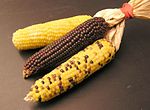
Parts Processing Pathology Corn-based products Raw materials Beverages Dishes Bread · Cookie · Corn flakes · Corn on the cob · Fufu · Grits · Hominy · Mazamorra · Mush · Pap · Piki · Polenta · Popcorn · Pudding corn · Sadza · Shawnee cakeCorn syrup Glucose syrup · High-fructose corn syrup (Health effects · Public relations) · High maltose corn syrupNon-food Categories:- African cuisine
- Burkinabé cuisine
- Cameroonian cuisine
- Ghanaian cuisine
- Guinean cuisine
- Ivorian cuisine
- Liberian cuisine
- Malian cuisine
- Nigerian cuisine
- Staple foods
- Maize
- Caribbean cuisine
- Gabonese cuisine
Wikimedia Foundation. 2010.

